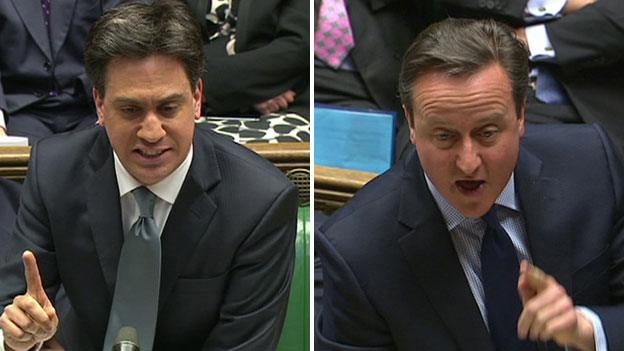David Cameron 'accepts single multi-party TV debate offer'
- Published
David Cameron: "I am helping to make this debate go ahead"
David Cameron says he has accepted an offer to take part in one seven-way TV debate at the beginning of April.
The prime minister previously said he would not participate in a debate after the start of the campaign on 30 March.
But he said the broadcasters had come back with a "formal offer" for a new format of TV election programmes, including one multi-party debate, which he said had signed up to.
Labour leader Ed Miliband challenged him to agree to a head-to-head debate.
Mr Miliband claimed the prime minister was going to "any lengths" to avoid debating with him and said it was time for him to "face the music".
Mr Cameron said the other parties must accept the new deal or "bear the responsibility" of the debates not going ahead.
Labour has said it still backs the original plan for three debates held during the official election campaign.
'Stop running away'
With the Lib Dems welcoming Mr Cameron's statement, the BBC's political correspondent Alex Forsyth said there appeared to be some "movement" to break the apparent stand-off between the parties.
Weeks of wrangling between the political parties and the BBC, Sky News, ITV and Channel 4 has cast doubt on whether the leaders' debates first held in 2010 will be repeated before the 7 May poll.
Earlier this month Mr Cameron rejected taking part in a head-to-head with Labour's Ed Miliband and said his "final offer" was to participate in a seven-way debate with the leaders of Labour, the Lib Dems, UKIP, the Green Party, the SNP and Plaid Cymru before the end of March.
Labour leader Ed Miliband: "I'm fighting for a head-to-head debate"
But on Tuesday he said he had accepted a deal put forward by the broadcasters to take part in a single debate involving the leaders of seven UK parties at the start of April.
"There was a formal offer of a set of television programmes including a televised debate, put together by the broadcasters led by the BBC. As prime minister, I accepted that deal in full," he said.
The PM added: "The other parties have now got to stop running away from this and agree to the debate that the broadcasters have now suggested."
BBC deputy political editor James Landale said the development was "significant" as it was the first time the prime minister had formally accepted any offer from the broadcasters on the debates.
But he cautioned that it did not mean any debate would definitely go ahead, saying Mr Cameron may have been "a touch premature" with his announcement.
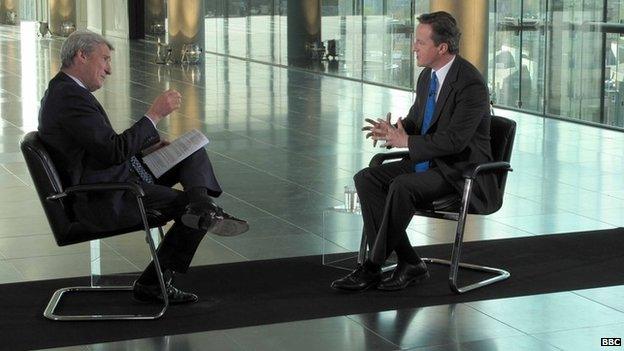
Jeremy Paxman will interview David Cameron and Ed Miliband separately for Channel 4 and Sky News under the revised proposals
Mr Miliband said he was "fighting" for a two-way debate between him and Mr Cameron - something he said the public wanted.
"We now have a tawdry spectacle of a prime minister going to any lengths to avoid that debate," he added.
Mr Miliband said the broadcasters had not put forward a new offer, and added that he would not "sanction a proposal, at this stage... that writes off the two-way debate between me and David Cameron".
'Election specials'
The Liberal Democrats said it was welcome news that the Conservatives had "finally agreed" to take part in "at least" one debate.
"As we've always said, we will be there and are pleased that they are joining us. We look forward to hearing proposals from the broadcasters about how we move forward from here," a spokesman said.
UKIP said it was unaware of the revised offer.
"The only proposal that we are aware of from the broadcasters was for three debates - two of which UKIP were invited to. We intend to turn up for those two debates," a spokesman told the BBC.
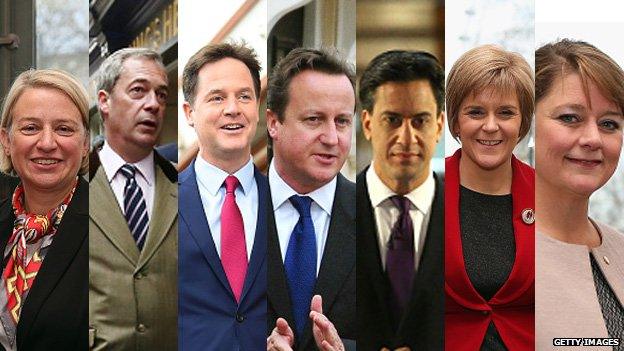
The broadcasters originally proposed three debates in April
SNP leader Nicola Sturgeon said that, in agreeing to debate during the campaign proper, Mr Cameron had staged an "inevitable climbdown".
The Spectator's political editor James Forsyth, external said that as well as one debate, a series of "election specials" involving the party leaders has been proposed during the campaign.
This would see David Cameron and Ed Miliband interviewed by Jeremy Paxman and then questioned by a studio audience in a Sky/Channel 4 special on 26 March, an event in which the two men would not share the stage.
On 16 April there would be a "challengers" special involving the SNP, UKIP, Plaid Cymru and the Greens and finally, on 30 April, David Cameron, Ed Miliband and Nick Clegg would each have separate half hours in a Question Time-style BBC event with David Dimbleby.
- Published17 March 2015
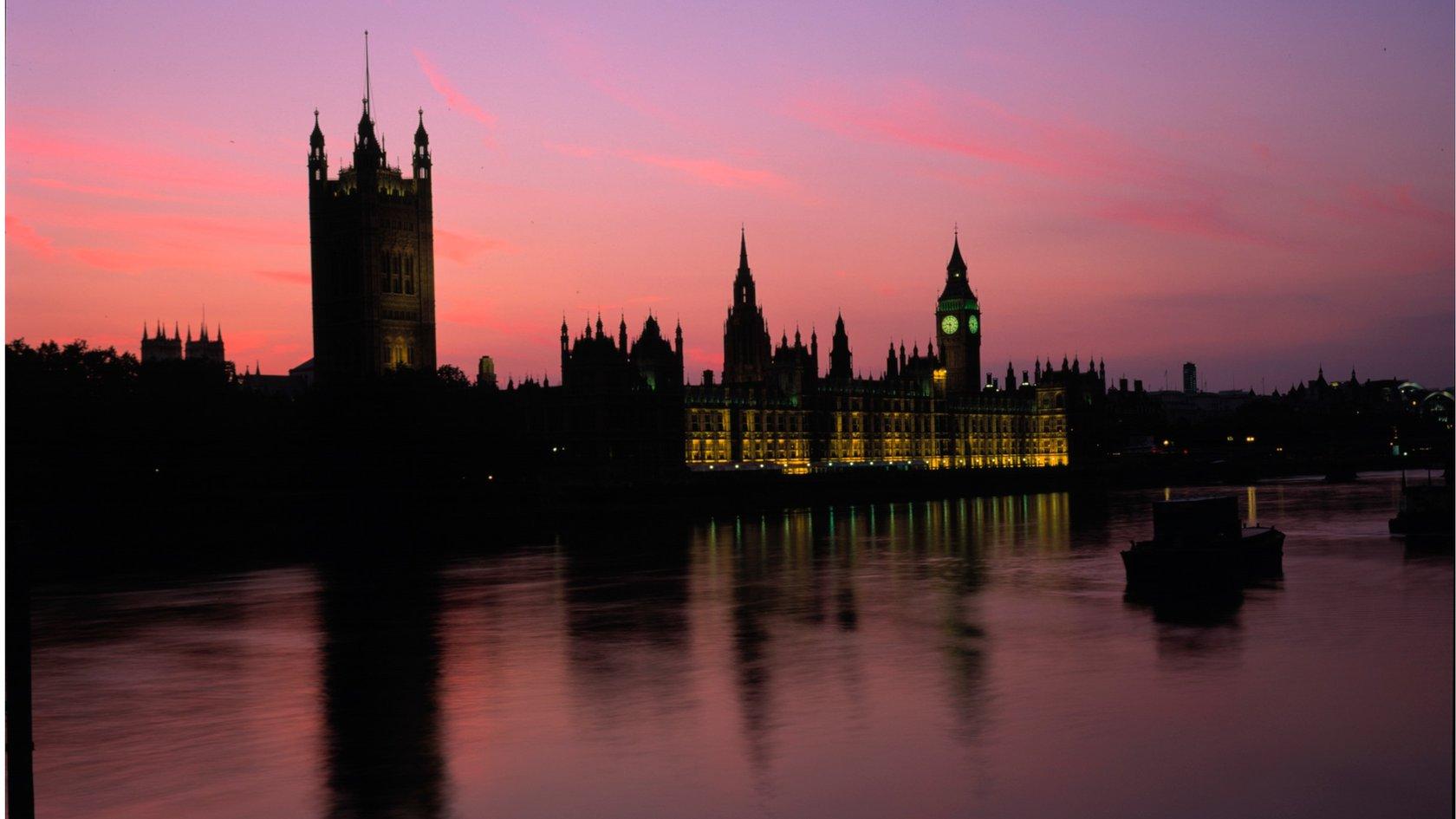
- Published5 March 2015
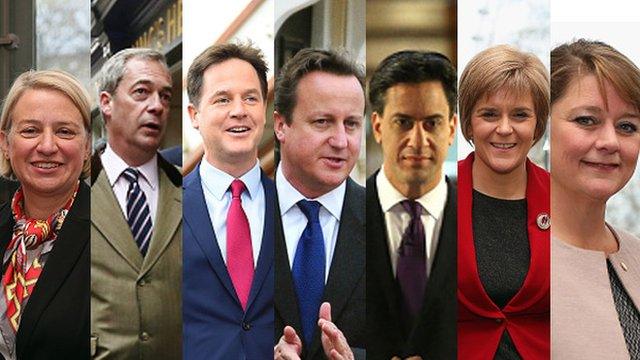
- Published11 March 2015
